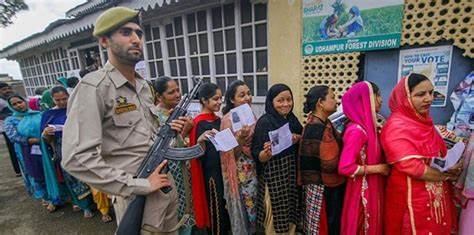National Conference (NC) leader Farooq Abdullah announced on August 16 that he will be leading the party in the upcoming Jammu and Kashmir Assembly elections, scheduled to take place in three phases starting from September 18.
This decision from the 86-year-old Farooq comes after his son, Omar Abdullah, decided not to participate in the elections until statehood is restored to Jammu and Kashmir.
“I will be contesting these elections, but Omar will not. Once statehood is restored, I will step down, and Omar will contest from that seat,” Farooq Abdullah told reporters in Jammu shortly after the Election Commission announced the election dates on Friday.
Restoring Statehood: Jammu and Kashmir was reorganized as a Union Territory after Article 370 was abrogated in 2019. The Prime Minister Narendra Modi-led Union government has promised to restore statehood to the region.
In an interview earlier this month with Indian Express, Omar Abdullah explained his decision to sit out this election, saying, “I have been a Chief Minister of a state. I can’t see myself in a position where I would have to ask the LG to appoint my peon. It’s as simple as that. I am not going to sit outside the LG’s waiting room, asking him to sign a file.”
Omar Abdullah lost the 2024 Lok Sabha elections from the Baramulla seat to Engineer Rashid, who is currently jailed under the UAPA.
The Jammu and Kashmir Assembly elections, being held after a ten-year gap, are the first since the PDP-BJP coalition government collapsed in June 2018, leading to Central rule in the region.
Spotlight on Farooq Abdullah, 86: With Omar stepping back, the focus shifts to Farooq Abdullah, who remains the president of the Jammu and Kashmir National Conference. A three-time Chief Minister of the former state and a former Union Minister, Farooq is one of the most influential political figures in the Kashmir Valley. Although he stepped away from contesting the 2024 general elections due to health concerns, he has remained active in politics.
Born in Srinagar in 1937, Farooq studied at a missionary school and later earned an MBBS degree from SMS Medical College, Jaipur. He practiced medicine in the United Kingdom before returning to India.
CM at 45: Farooq Abdullah first entered public office in 1980 as an MP from the Srinagar Lok Sabha seat. A year later, he became the president of the National Conference, succeeding his father, Sheikh Abdullah. Farooq first served as Chief Minister of Jammu and Kashmir in 1982 at the age of 45, following his father’s death. He later held the position in 1986 and again in 1996, serving a full six-year term until 2002.
His son, Omar Abdullah, took over the leadership of the party in 2002, with Farooq focusing more on national politics. Farooq won the Lok Sabha elections in 2009, 2017, and 2019 from the Srinagar seat and served as the Union Minister for New and Renewable Energy between 2009 and 2014.
Just days before the election dates were announced, the Jammu and Kashmir High Court quashed a money laundering case filed against Farooq by the Enforcement Directorate.
Active in Political Circles: Despite not contesting the Lok Sabha polls, Farooq Abdullah has remained active in political affairs, attending party meetings and making public appearances. He was among the first leaders from J&K to be detained in the lead-up to the abrogation of Article 370 in 2019.
Farooq also led the now-defunct People’s Alliance for Gupkar Declaration (PAGD), an alliance of political parties in Jammu and Kashmir advocating for the restoration of the region’s special status under Article 370. In December 2020, PAGD won the maiden District Development Council (DDC) polls, the first elections held in the region after the abrogation of Article 370.
According to the biography “Farooq of Kashmir” by Ashwini Bhatnagar and RC Ganjoo, former Prime Minister Indira Gandhi saw potential in Farooq Abdullah, viewing him as a promising yet inexperienced leader who could be molded. Despite growing up in the shadow of his father, Farooq has over four decades of political experience, making him a key figure in Jammu and Kashmir’s political landscape. Observers believe that if tested, Farooq might even overshadow his son in terms of popularity.
With the first phase of voting just a month away, all eyes will be on Farooq Abdullah as he takes on a central role in the region’s political scene.

